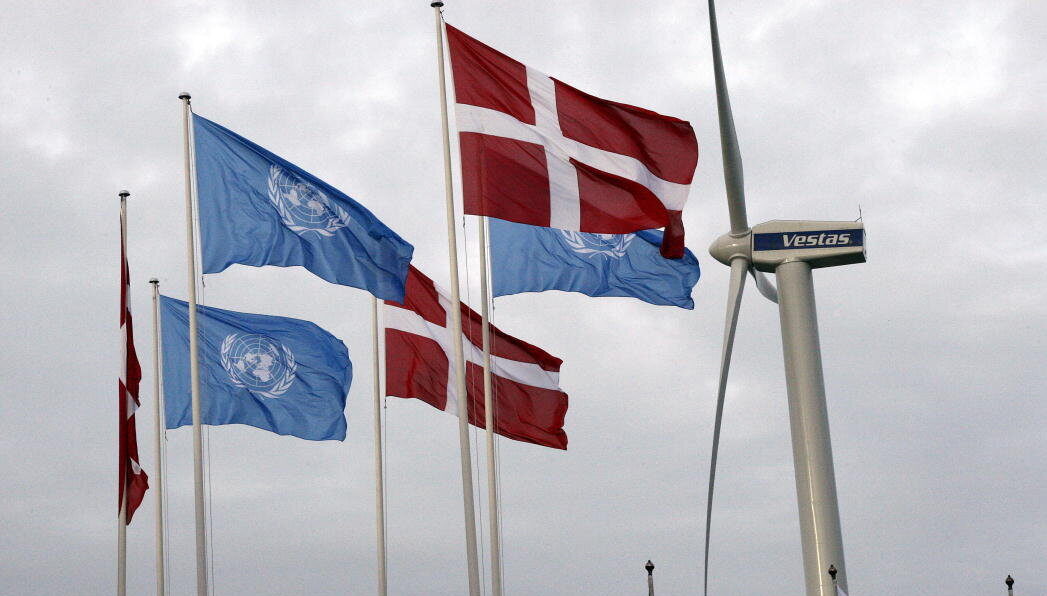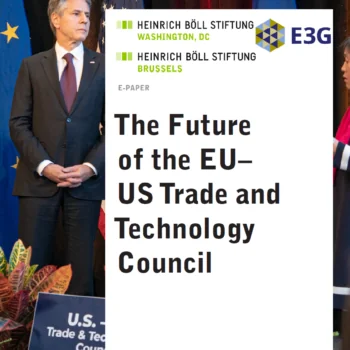- The Copenhagen Climate Ministerial takes place on 21-22 March 2024. It is the first major climate meeting since COP28 and an early opportunity this year for governments to set expectations on what COP29 under the Presidency of Azerbaijan this November must achieve.
- The discussions will have a strong focus on the next climate finance goal – the biggest issue on the COP29 agenda – and the next generation of climate plans (NDCs) that all countries are required to update by early 2025.
- E3G will be co-hosting a hybrid public high-level panel on March 20th in Copenhagen ahead of the Copenhagen Climate Ministerial to present and discuss concrete recommendations for implementing the Vision of the Climate & Development Ministerial for Adaptation Finance.
Story
On 21-22 March 2024, the Copenhagen Climate Ministerial will bring together governments for the first political climate talks since COP28. The Ministerial is an important moment early this year for countries to set clear expectations around COP29 in Azerbaijan this November.
It is the first major political meeting attended by the incoming COP29 Presidency Azerbaijan and an early opportunity to set the agenda and outline their aims for what the COP29 summit must deliver.
It is also the first high-profile political platform for the ‘COP Troika’ of the COP28, COP29, and COP30 Presidencies (UAE, Azerbaijan and Brazil respectively) launched last month. The Troika will be expected to set out their vision for guiding global climate talks over 2024 and 2025 in the run-up to the biggest climate summit since the Paris Agreement in 2015 – COP30, in Belem, Brazil in November 2025.
The Copenhagen meeting is the beginning of the ‘Road to Belem’. In 2025, governments will be judged on the delivery of a gamut of climate promises. This includes commitments to transition away from fossil fuels, address climate, health and biodiversity, and strengthen action on adaptation and loss and damage. The next two years until COP30 are the most consequential of the ‘critical decade’ for climate safety and for keeping multilateralism alive in a context of geopolitical turmoil.
The closed-door discussions in Copenhagen are expected to centre on finance, especially the negotiations for the next climate finance goal due to be agreed upon at COP29 (the New Collective Quantified Goal, NCQG).
A major area of attention will also be the next generation of climate transition commitments (Nationally Determined Contributions, NDCs) that all countries are due to submit in the next 12 months. In the run-up to Copenhagen, the UN climate chief Simon Stiell called these “the most important climate documents produced so far this century”.
Quotes
Juan Pablo Osornio, Programme Lead, E3G said:
“The ratchet mechanism in the Paris Agreement was set to increase the ambition of Nationally Determined Contributions (NDC) every five years. It is the heart of the Paris Agreement. Governments need to enhance their NDCs in 2025, to strengthen the climate regime and trust on the multilateral system to address global crises.”
Tom Evans, Senior Policy Advisor, E3G said:
“Finance is the litmus test for COP29. Negotiations on the new climate finance goal are an opportunity to answer the challenge faced by developing countries: of how to unlock the trillions in dollars of investment they need for climate action. A good goal will foster confidence that finance will flow to drive their fossil-free development and give them the confidence to raise the ambition of their next generation climate transition commitments by 2025. The Copenhagen Ministerial is the start of political talks on the goal this year. It must be a chance to bring common understanding around this divisive but decisive issue”.
Ana Mulio Alvarez, Researcher, E3G said:
“Adaptation must be an integral part of the new NDCs and the NCQG. The 2023 Climate and Development Vision for Adaptation Finance sets out a specific roadmap for scaling and enhancing adaptation finance access and delivery. Ministers should make use of this roadmap as they set the agenda and priorities for this year and begin to materialise the shift towards systemic resilience that is needed to avoid further Losses and Damages.”
– ENDS –
Available for comment
Tom Evans (EN), E3G Senior Policy Advisor, (COP29, NDCs, NCQG)
m: +44 7931 317 327 | tom.evans@e3g.org
Juan Pablo Osornio (EN, ES, DE), E3G Programme Lead, (Road to Belem, Geopolitics of Climate Change)
m: +49 (0) 151 1676-2877 | juanpablo.osornio@e3g.org
Ana Mulio Alvarez (EN, ES), E3G Researcher, (COP29, Adaptation, Loss and Damage, Climate and Development Ministerial)
m: +32 490 000 514 | ana.mulio@e3g.org
Notes to Editors
- E3G is an independent climate change think tank with a global outlook. We work on the frontier of the climate landscape, tackling the barriers and advancing the solutions to a safe climate. Our goal is to translate climate politics, economics and policies into action. About – E3G
- For further enquiries email press@e3g.org or phone +44 (0)7783 787 863
- Register for our journalist WhatsApp briefing service to receive updates and analysis for key geopolitical and climate events over 2024 and 2025 on the road to COP29 and COP30: E3G WhatsApp registration for journalists – E3G.


